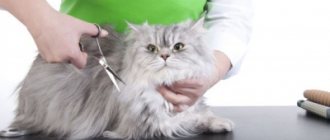Castration of cats is a surgical procedure during which the animal is completely deprived of the possibility of procreation. Thanks to her, the cat becomes calmer and more affectionate. In a number of countries, this procedure is mandatory when keeping cats at home.
Before deciding to undergo castration surgery on a cat, it is worth finding out whether it is necessary to castrate a cat when keeping it at home, why this operation is required and what it gives.
Why do they do this?
When a cat reaches 9-10 months of age, his instincts begin to manifest themselves with might and main. One of them is the fight for territory. The pet constantly defecates to show that it is the boss in the apartment and this creates an unbearable environment.
Should a cat be neutered?
In an effort to gain the attention of cats, the male cat constantly makes loud cries, preventing anyone from sleeping. In this case, the owner decides whether the cat needs to be castrated, but the inconvenience factor often tips the scales in favor of the procedure.
In order to make a normal life possible with a cat in an apartment, he is castrated.
Important! If the operation is performed earlier than the recommended age, this may lead to disturbances in the development of the animal’s genitourinary system.
Harm of the operation
You can avoid surgery and not cause stress to the animal by using medications to combat sexual desire.
Before castration, the owner must take the advice of a veterinarian. It should also be taken into account that all surgical interventions cause stress to the cat. Owners of overly susceptible cats are advised to first use a gentle method to combat sexual desire, for example, the use of special medications.
The disadvantages of castration include the fact that for several days after it is carried out, the owner will need to carefully care for and be close to the pet. It is necessary to limit his mobility and not allow him to climb onto high surfaces. In addition, the operation is dangerous because the possibility of infection cannot be ruled out. To avoid such postoperative consequences, antibiotics are prescribed. After surgery, the pet may gain weight, so the owner needs to monitor its diet.
Is it necessary to neuter a domestic cat?
Is it necessary to sterilize a cat: what will happen if you don’t?
If this operation is not carried out, then life with a sexually mature cat in an apartment may become unbearable. For example, he may urinate in freshly washed bedding to mark his territory.
And loud screams do not just create discomfort, they are strong and shrill, and the cat literally does not let you sleep at night. Therefore, in many cases, it is a matter of choosing between living with it for years, throwing the animal out into the street altogether, or castrating it, making it someone you can get along with.
Of course, its owners can make different choices, but the last option will allow them to find a solution that is beneficial to all parties. From what has been said, it is clear whether it is worth castrating the cat.
We picked up a kitten from the street: first steps
It doesn’t matter whether you take into your home an adult cat, a teenager or a tiny kitten. The procedure will be approximately the same
First: warm up
Most homeless animals die in winter. In search of warmth, kittens climb under the hoods of cars, look for heating mains and heated sewer hatches, and get into entrances. The meager diet of stray cats means sparse hair, a complete absence of fat and a lack of energy to heat the body. If an animal has nowhere to warm itself, it dies.
Cats have a hard time surviving without a food source in winter.
In winter, it is easier to catch a wild street kitten - he himself can rush into his arms in search of warmth. It is best to place the baby in the bosom, especially if it is a long walk to the house. Every minute of hypothermia takes away strength and health from the baby.
Second: feed
Hunger is another enemy of stray animals. In the summer, at least they do not suffer from the cold, but not everyone is always able to eat enough. It is especially difficult for kittens who are left without a mother. If they are not picked up by a compassionate person, they have no chance to survive.
You cannot feed the kitten from the table. A hungry baby will swallow pasta with sausage or a piece of bread, but this does not mean that it will be able to avoid digestive problems. The stomach and liver of babies are weak, food should be without spices and suitable for cats. Many kittens cannot digest whole cow's milk; contrary to popular belief, it is not a suitable food for them.
Kittens drink milk
It is convenient to use industrial feed. For the smallest - a cat's milk substitute, for kittens over 1 month - special canned food, and from 2-3 months - dry food.
There is no point in buying baby food for a kitten: the cost is not inferior to high-quality canned food intended for kittens. If you already have jars at home, meat food should be mixed with vegetable food.
Although it is recommended to feed the kitten as much as possible, you should not allow the foundling to overeat. At first, you will have to control the portion size - feed often, but little by little. It is ideal if the food is warm.
Read more: how to raise newborn kittens without a cat
Third: get rid of fleas
I have never met a stray kitten that was not infected with external parasites. In addition to fleas, the baby may have ear scabies (otodectosis). If the animal is clearly more than 1.5-2 months old, you can use drops on the withers. If the kitten is very tiny, then Frontline spray or its analogues (fipronil) is preferable.
Before treatment, I advise you to weigh your pet (it’s convenient to use a kitchen scale; place the kitten in a container). If the mass is less than 1 kg, most drops on the withers will be too toxic.
Consult your veterinarian, or read the instructions carefully. There is no point in saving on antiparasitic drugs, the kitten is already weakened. I like the alcohol-based Stronghold drops. They act on fleas, ear mites, and roundworms.
Getting rid of fleas is very important. Their bites not only cause severe itching
In a small kitten, parasites can drink so much blood that anemia develops. In addition, fleas are a source of intestinal parasites.
If there are other animals in the house, all should be treated for fleas at the same time.
All street kittens are infected with parasites
Fourth: set up an isolation ward
If there are other pets at home, then you need to endure a 2-week quarantine for the newcomer. And even if you don’t have anyone at home yet (fish don’t count), I don’t recommend letting your kitten out of the street to roam freely around the apartment.
The kitten is probably deathly scared. In search of shelter, he can hide anywhere - behind the refrigerator, under the bathtub, under the sofa. And meow there for several days in a row, refusing to leave. To get by force means to ruin a relationship. If you don’t take it out, it will ruin the smell in the apartment, because no matter how scared you are, you still need to write.
It is better if you give the kitten one room with a closed door and a safe environment. Kitchen. Room. Yes, at least the toilet. Although there is not much space there, you will definitely visit your pet often. In this room you need to place a toilet tray with sawdust or bentonite clay. Prepare a place to sleep (box, bed, blanket). A bowl of water is available around the clock, and food is given out personally - so that the baby associates your appearance with a pleasant event.
You can disinfect this room if the kitten is sick with lichen, panleukopenia, or simply craps everything around. This is much easier than washing the entire apartment (where there are carpets, upholstered furniture, etc.).
After a couple of weeks, the little cat will get used to both you and the environment. Then he can be introduced to the rest of the house, and over time, to other pets.
The kitten rummages in the sawdust, intuitively understanding the purpose of the tray
The effect of castration on an animal
During the operation, the cat's testes are removed. After this, he is unable to produce not only semen, but also sex hormones. If it is said that the animal is a cryptorchid, then the testicle is removed.
Does a castrated cat live less?
Preparing a cat for castration: what you need to know before the operation
This is not supported by facts. Studies have shown that an operated cat's life expectancy is usually 2-3 years longer. Thus, castration gives the domestic cat years of a well-fed and comfortable life.
A castrated cat will get urolithiasis
The likelihood of disease increases if the animal gains a lot of weight and does not want to go outside.
However, if you feed him food specially designed for operated cats, then this situation will not occur and the risk of disease will be the same as for other felines.
When asked whether a domestic cat should be neutered, the veterinarian's advice says that it is not only advisable, but also safe for the animal.
Cat behavior after castration
It is believed that food will become the main pleasure of his life, and this will inevitably lead to obesity and many other diseases.
After the operation, his motor activity will decrease and this will contribute to the worsening of the situation. However, you need to remember that the nutrition of a domestic cat will depend on the food that the owner gives him.
Attention! With the right diet, the cat will receive as many calories as it needs and there will be no reason for obesity.
A castrated cat is deprived of an important aspect of his life.
The intimate life of cats is not even remotely reminiscent of humans. These animals do not create strong pairs, and their meetings are dictated by instincts. For example, the cats that Kuklachev trains learn new tricks because he understands the nature of these animals well.
Important! Sometimes they try to solve the problem by finding a permanent girlfriend. However, in this case, the screams and the desire to mark will not disappear, but the problem with kittens will be added.
They will have to be attached, which is usually difficult to do. Otherwise, you will need to feed the straight-eared and lop-eared ones yourself in ever-increasing quantities.
The structure of the cat's genitourinary system
Is it necessary to sterilize a cat?
Let us say right away that there are much fewer arguments against than for. Most people do not want to perform an operation on a cat for humane reasons, fearing that the animal will suffer and lose all the delights of life as a sexually mature animal. In fact, the operation is painless, under anesthesia, and after sterilization the cats recover quickly. Regarding ethical issues, it is worth remembering:
- cats do not enjoy mating;
- The maternal instinct of a domestic animal is rarely fully realized, as in its wild counterparts. Kittens are often taken away when they are still small, the cat does not even raise them, only feeds them;
- The benefits of sterilization are quite significant.
VETERINARIAN'S OPINION: Cats should be sterilized for several reasons:
The risk of inflammatory and tumor diseases of the genitourinary system is reduced
Perhaps this is the most valuable “consequence” of sterilizing cats. The animal does not rush around and does not scream during the days of estrus (if it stops), which is especially important for owners who do not have the opportunity to let the cat outside. There is no need to constantly drive cats away from your cat during heat. Uncontrollable bowel movements during menstruation are excluded. The cat calms down, does not rush to go outside, and spends more time at home with its owners.
What to do if a cat marks after castration
Unfortunately, surgery does not always solve the problem that a Maine Coon or other cat leaves marks. It is necessary to understand the difference between carelessly going to the toilet and leaving marks. In the latter case, vertical surfaces or the owner’s things are wetted. In addition, the smell is attractive to females.
What happens if you cut a cat's whiskers: will they grow back?
Marking is usually done by males who have been castrated as adults. When the operation is performed at 8-9 months, this behavior has not yet had time to form.
Important! However, the habit does not last forever. It stops after 4-12 weeks.
The duration of the period is longer, the older the animal undergoing the operation. Moreover, the sharpness of the smell will gradually disappear from the tags. This is due to the cessation of production of sex hormones.
Diseases
Unneutered cats are susceptible to the following diseases:
- Prostatitis is an inflammation of the prostate gland that occurs due to the penetration of pathogenic microorganisms into the prostate tissue.
- Diseases of the urinary system. Among them: urolithiasis;
- urocystitis (inflammation of the bladder);
- nephrosis;
- nephritis;
- pyelonephritis.
Castration will greatly reduce the risk of these diseases.
Thus, surgery is the safest and most humane way to solve all problems associated with cat behavior.
Advantages and disadvantages of castration
Castration has its positive and negative sides. Below they are presented in more detail.
The cat cannot eat for 12 hours before surgery
Pros of castration
As a result of the operation, there are positive aspects for the animal:
- The animal's character changes significantly. He shows more calmness and friendliness. The cat is not characterized by aggression, which can usually be seen during the period when he is looking for a female.
- Loud screams at night stop. In most cases, the habit of marking territory is a thing of the past, but this is not always the case.
- It does not contribute to the birth of kittens, which usually face a sad fate in cases where there is no possibility of placing them.
- Since they do not chase females down the street, the likelihood of genitourinary diseases is reduced.
- By limiting contact with street animals, the likelihood of infectious infection decreases.
These changes make it possible to make the cat's behavior in the apartment more acceptable. After the operation, he really becomes a harmless furry pet, without mood swings.
A castrated cat should be fed with special dietary food.
Disadvantages of castration
Sometimes surgery can lead to the following undesirable consequences:
- Neutered cats, especially British cats, are prone to obesity.
- After such changes, the previous diet will no longer be suitable - animals need special food, which is more expensive than before.
- Scottish cats and representatives of some other breeds after castration are prone to diabetes, urolithiasis and cardiac disorders.
- Due to the anesthesia during surgery, some cats may experience serious problems.
Once the operation is performed, it is impossible to return everything back. This should be kept in mind by those who plan to have it performed on a purebred animal in a private clinic.
Hormonal drugs
There are many special drugs designed to suppress sexual desire in cats. They are available in the form of drops, tablets or injections.
Hormonal drugs, including “Sex Barrier”, “Contrasex”, “Nonoestron”, “Stop-Intim” and others, are often used by owners of uncastrated cats, allowing them to temporarily reduce the troubles that their behavior causes.
A significant disadvantage of hormonal drugs is the enormous harm they cause to the health of the animal. Frequent use can lead to consequences such as diabetes, cancer and other diseases.
In case of emergency, veterinarians recommend using natural-based sedatives, such as “Cat Bayun” and “Stop-stress”. They are not as effective as hormonal ones, but they do not harm the health of the animal.
What happens if you don't castrate your cat?
If he is not sterilized, then there are two options: tolerate his behavior and take it for granted, or get rid of the animal and give it to friends. Radical option: just throw him out onto the street. In both situations, a good relationship with the cat will not work.
This is interesting! When asked whether a cat can be neutered, the answer is yes. However, this operation has another name - sterilization.
Spaying your cat will help prevent the birth of unwanted kittens.
Sterilization of a cat without castration
In order for an animal not to have offspring, it is not necessary to carry out surgical castration; it can be done without it. If you ligate the spermatic cords, this will eliminate the possibility of semen production.
Carrying out the operation
In this case, the possibility of giving birth to kittens is excluded, but the cat will not stop marking the territory and making loud screams.
Such an operation will not solve the main problem of the owners, therefore, for the desired effect, surgical castration must be performed.
Neutering a cat can cause different feelings, but it is usually the only way to keep a cat indoors. Before purchasing a pet, you need to think about the necessary surgery in advance.











